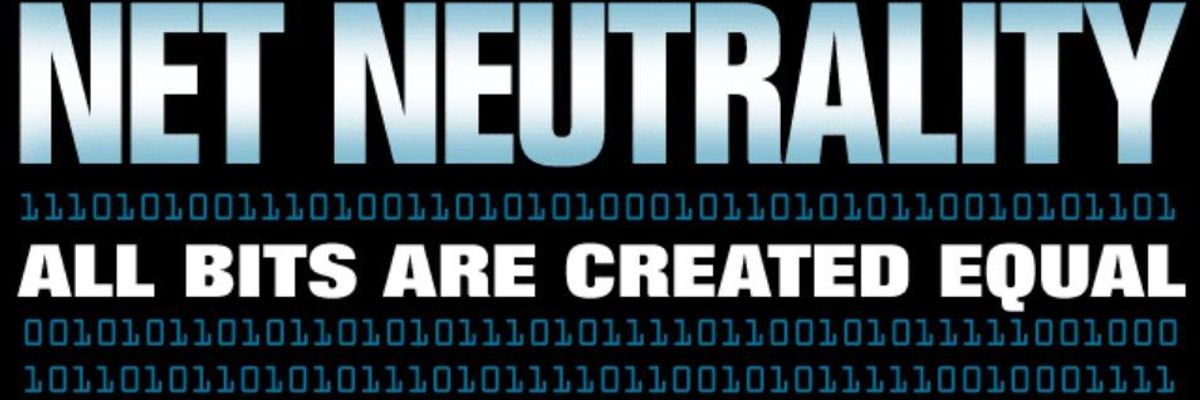Net neutrality is a civil rights issue - and it appears the FCC will soon implement real net neutrality protections, thanks in large part to civil rights activists.
Media and communications technology has always been an important factor in activism, because it mediates how activists can communicate with each other and to the world. During the civil rights movement of the 50s and 60s, organizers used phone trees and mimeographed pamphlets to distribute information and coordinate collective action. Black radio stations served as community bulletin boards and disseminated information about marches, police roadblocks, and voter registration.
Today's civil rights activists have a much more powerful tool at our disposal - the open Internet. Our ability to be heard, counted, and visible in this democracy now depends on an open Internet, because it allows voices and ideas to spread based on their quality - not the amount of money behind them.
In the wake of tragic and unjust police killings of unarmed black people in Ferguson, Staten Island, and across the country, young black people are using the Internet to organize in new ways. Organic, grassroots efforts like #IfIWasGunnedDown and #BlackLivesMatter are powerfully impacting the public conversation about race and the criminal justice system, and helping usher in a new era of progress and change.
ColorOfChange.org, the organization I direct, has spearheaded or contributed to dozens of important civil rights victories. We began in 2005, in the wake of Hurricane Katrina, with nothing more than a basic website and an email to about two thousand friends, family, and colleagues. Over the years, our membership grew as people signed our petitions and passed them on to people they knew. Our message spread to the degree that it resonated.
Now, we have over a million members - black people and our allies of all races - and when we speak with a collective voice, decision-makers listen. Without deep pockets or long-established relationships in Washington, we have been able to build real political power. But without net neutrality, we never would have had a chance.
However, until recently, if you read a story about civil rights and net neutrality, it probably said that civil rights organizations opposed net neutrality. Why?
Sadly, some of the country's oldest, most established, and well-funded civil rights groups have sided with Internet service providers in opposing net neutrality. It's hard to ignore the fact that the FCC filings and editorials penned by these groups - "cautioning" against strong net neutrality protections - come after millions of dollars in donations from Internet service providers like AT&T, Verizon, and Comcast, who have a huge financial interest in acting as gatekeepers over what we see and do online.
Groups like the Urban League, Rainbow PUSH, and NAACP saw the battle over net neutrality as an opportunity to take money from the telecom industry. While the donations they received may be large from the perspective of a non-profit, they are a very small price given that destroying net neutrality would limit our future power to organize on every issue that matters to our communities.
Armed with telecom money, these groups echoed talking points from the industry rooted in trickle down economics, saying that if the telecoms could make more money by creating fast lanes and slow lanes online, it would eventually help people of color by expanding Internet access in our communities.
These groups aren't representing the voices of their constituents on net neutrality. They never talk to their members about it, preferring to stake out their positions in opinion pieces, letters, and filings targeted at Washington. But for years, they succeeded in advancing a false narrative about people of color and net neutrality.
As we pushed back, I was told by some that were being paid to carry water for the telecom industry that we didn't know how Washington worked; that that it was a done deal; that the combination of big telecom companies and the legacy civil rights groups that had their money was too strong for us and our allies to face down.
What they underestimated was the power of ordinary people using our voices strategically, in large numbers. Over the last year, we defied the conventional wisdom in Washington that money always beats people power.
ColorOfChange members worked together with groups like the Center for Media Justice, the National Hispanic Media Coalition, Free Press, and CREDO Action to make it clear to the FCC and Congress that net neutrality is essential to the civil rights movement of the 21st century. Young organizers in Ferguson, Oakland, Staten Island and elsewhere demonstrated as much with their actions.
Rep. John Lewis (D-Ga.), a civil rights hero, spoke out and underscored the importance of net neutrality for civil rights, saying "if we had the internet during the movement, we could have done more, much more, to bring people together from all around the country, to organize and work together to build the beloved community." Political leaders like Reps. Keith Ellison (D-Minn.) and Maxine Waters (D-Calif.) rallied their colleagues in the Congressional Black Caucus to support net neutrality in greater numbers than ever before.
President Obama spoke out forcefully - which would have been much harder for him to do if it were perceived as acting against the wishes of the civil rights community. The president's action changed the political calculus in Washington, giving the FCC cover to push for stronger net neutrality rules.
In short: multiple generations of civil rights leadership have come together to define net neutrality as a 21st century civil rights issue. If the FCC stands strong against desperate, last-minute attempts to undermine its work, its net neutrality rules will be seen by generations to come as a major civil rights accomplishment, setting the stage for the continuation and acceleration of movements for justice and equality.
